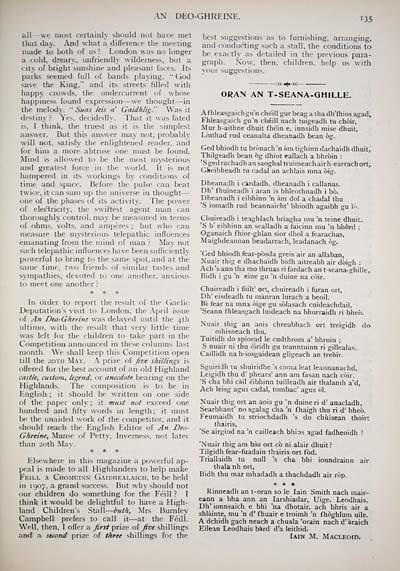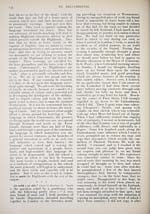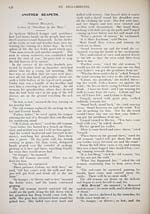Blair Collection > Deo-gréine
(159)
Download files
Complete book:
Individual page:
Thumbnail gallery: Grid view | List view

AN DEO-GHREINE
135
all — we most certainly should not have met
that day. And what a different :e the meeting
made to both of us ! London was no longer
a cold, dreary, unfriendly wilderness, but a
city of bright sunshine and pleasant faces. Its
parks seemed full of bands playing, "God
save the King," and its streets filled with
happy crowds, the undercurrent of whose
happiness found expression — we thought — in
the melody, " Suas leis a Gaidhlig." Was it
destiny? Yes, decidedly. That it was fated
is, 1 think, the truest as it is the simplest
answer. But this answer may not, probably
will not, satisfy the enlightened reader, and
for him a more abtruse one must be found.
Mind is allowed to be the most mysterious
and greatest force in the world. It is not
hampered in its workings by conditions of
time and space. Before the pulse can beat
twice, it can sum up the universe in thought —
one of the phases of its activity. The power
of electricity, the swiftest agent man can
thoroughly control, may be measured in terms
of ohms, volts, and amperes ; but who can
measure the mysterious telepathic influences
emanating from the mind of man ? May not
such telepathic influences have been sufficiently
powerful to bring to the same spot, and at the
same time, two friends of similar tastes and
sympathies, devoted to one another, anxious
to meet one another?
* * *
In order to report the result of the Gaelic
Deputation's visit to London, the April issue
of An Deo-Ghreine was delayed until the 4th
ultimo, with the result that very little time
was left for the children to take part in the
Competition announced in these columns last
month. We shall keep this Competition open
till the 20TH May. A prize of five shillings is
offered for ihe best account of an old Highland
castle, custom, legend, or anecdote bearing on the
Highlands. The composition is to be in
English ; it should be written on one side
of the paper only ; it must not exceed one
hundred and fifty words in length; it must
be the unaided work of the competitor, and it
should reach the English Editor of An Deo-
Ghreine, Manse of Petty, Inverness, not later
than 20th May.
* * *
Elsewhere in this magazine a powerful ap-
peal is made to all Highlanders to help make
Fkill a Chomuinn Gaidhealaich, to be held
in 1907, a grand success. But why should not
our children do something for the Fèill ? I
think it would be delightful to have a High-
land Children's Stall — buth, Mrs Burnley
Campbell prefers to call it — at the Feill.
Well, then, I offer a first prize of five shillings
and a second prize of three shillings for the
best suggestions as to furnishing, arranging,
and conducting such a stall, the conditions to
be exactly as detailed in the previous para-
graph. Now, then, children, help us with
your suggestions.
ORAN AN T-SEANA-GHILLE.
Af hleasgaichgu'n cheill gur beag a tha dh'fhios agad,
Fhleasgaich gun chèill nach tuigeadh tu choir,
Mur h-aithne dhuit fhein e, innsidh mise dhuit,
Liuthad rud ceanalta dheanadh bean òg.
Ged bhiodh tu brònach'n àm tighinn dachaidh dhuit,'
Thilgeadh bean òg dhiot eallach a bhròin :
'S ged rachadh an saoghal truimeach air h-earrach ort,.
Gheibheadh tu cadal an achlais mna òig.
Dheanadh i càrdadh, dheanadh i callanas.
Dh' fhuineadh i aran is bhleothnadh i bò.
Dheanadh i eibhinn 'n àm dol a chadal thu
'S iomadh rud beannaicht' bhiodh agaibh gu 16.
Chuireadh i teaghlach briagha mu 'n teine dhuit,
'S b' eibhinn an sealladh a faicinn mu 'n bhòrd ;
Oganaich fhior-ghlan sior dhol a fearachas,
Maighdeannan beadarrach, leadanach òg.
'Ged bhiodh fear-pòsda greis air an allaban,
Nuair thig e dhachaidfTbidh aitreabh air dòigh ;
Ach 's ann tha mo thruas ri fàrdach an t-seana-ghille r
Bidh i gu 'n eine gu 'n duine na còir.
Chuireadh i fàilt' ort, chuireadh i furan ort,
Dh' eisdeadh tu mànran lurach a beoil.
Bi fear na mna òige gu sòlasach cuideachdail,
'Seann fhleasgach luideach na bhurraidh ri bheò.
Nuair thig an aois chreubhach ort treigidh do>
mhisneach thu,
Tuitidh do spiorad le cudthrom a' bhroin ;
S nuair ni thu eiridh gu teanntuinn ri gillealas.
Caillidh na h-iosgaidean gligeach an treòir.
Sguiridh tu shuiridhe 's coma leat leannanachd,
Leigidh thu d' phears' ann am fasan nach còir.
'S cha bhi càil eibhinn tuilleadh air thalamh a'd,
Ach leisg agus cadal, tombac' agus òl.
Nuair thig ort an aois gu 'n duine ri d' anacladh,
Searbhant' no sgalag cha 'n fhaigh thu ri d' bheò.
Feumaidh tu striochdadh 's do chuisean thoirt
thairis,
'Se airgiod na 'n cailleach bhios agad fadheoidh >.
'Nuair thig am bàs ort cò ni alair dhuit?
Tilgidh fear-fuadain thairis ort fod.
Triallaidh tu null 's cha bhi ionndrainn air
thalanh ort,
Bidh thu mar mhadadh a thachdadh air ròp.
* * *
Rinneadh an t-oran so le Iain Smith nach mair-
eann a bha ann an Iarshiadar,. Uige, Leodhais,
Dh' ionnsaich e bhi 'na dhotair, ach bhris air a
shlàinte, mu 'n d' fhuair e troimh 'n fhòghlum uile.
A dchidh gach neach a chuala 'orain nach d'àraich
Eilean Leodhais bàrd d'a leithid.
Iain M. Macleoid.
135
all — we most certainly should not have met
that day. And what a different :e the meeting
made to both of us ! London was no longer
a cold, dreary, unfriendly wilderness, but a
city of bright sunshine and pleasant faces. Its
parks seemed full of bands playing, "God
save the King," and its streets filled with
happy crowds, the undercurrent of whose
happiness found expression — we thought — in
the melody, " Suas leis a Gaidhlig." Was it
destiny? Yes, decidedly. That it was fated
is, 1 think, the truest as it is the simplest
answer. But this answer may not, probably
will not, satisfy the enlightened reader, and
for him a more abtruse one must be found.
Mind is allowed to be the most mysterious
and greatest force in the world. It is not
hampered in its workings by conditions of
time and space. Before the pulse can beat
twice, it can sum up the universe in thought —
one of the phases of its activity. The power
of electricity, the swiftest agent man can
thoroughly control, may be measured in terms
of ohms, volts, and amperes ; but who can
measure the mysterious telepathic influences
emanating from the mind of man ? May not
such telepathic influences have been sufficiently
powerful to bring to the same spot, and at the
same time, two friends of similar tastes and
sympathies, devoted to one another, anxious
to meet one another?
* * *
In order to report the result of the Gaelic
Deputation's visit to London, the April issue
of An Deo-Ghreine was delayed until the 4th
ultimo, with the result that very little time
was left for the children to take part in the
Competition announced in these columns last
month. We shall keep this Competition open
till the 20TH May. A prize of five shillings is
offered for ihe best account of an old Highland
castle, custom, legend, or anecdote bearing on the
Highlands. The composition is to be in
English ; it should be written on one side
of the paper only ; it must not exceed one
hundred and fifty words in length; it must
be the unaided work of the competitor, and it
should reach the English Editor of An Deo-
Ghreine, Manse of Petty, Inverness, not later
than 20th May.
* * *
Elsewhere in this magazine a powerful ap-
peal is made to all Highlanders to help make
Fkill a Chomuinn Gaidhealaich, to be held
in 1907, a grand success. But why should not
our children do something for the Fèill ? I
think it would be delightful to have a High-
land Children's Stall — buth, Mrs Burnley
Campbell prefers to call it — at the Feill.
Well, then, I offer a first prize of five shillings
and a second prize of three shillings for the
best suggestions as to furnishing, arranging,
and conducting such a stall, the conditions to
be exactly as detailed in the previous para-
graph. Now, then, children, help us with
your suggestions.
ORAN AN T-SEANA-GHILLE.
Af hleasgaichgu'n cheill gur beag a tha dh'fhios agad,
Fhleasgaich gun chèill nach tuigeadh tu choir,
Mur h-aithne dhuit fhein e, innsidh mise dhuit,
Liuthad rud ceanalta dheanadh bean òg.
Ged bhiodh tu brònach'n àm tighinn dachaidh dhuit,'
Thilgeadh bean òg dhiot eallach a bhròin :
'S ged rachadh an saoghal truimeach air h-earrach ort,.
Gheibheadh tu cadal an achlais mna òig.
Dheanadh i càrdadh, dheanadh i callanas.
Dh' fhuineadh i aran is bhleothnadh i bò.
Dheanadh i eibhinn 'n àm dol a chadal thu
'S iomadh rud beannaicht' bhiodh agaibh gu 16.
Chuireadh i teaghlach briagha mu 'n teine dhuit,
'S b' eibhinn an sealladh a faicinn mu 'n bhòrd ;
Oganaich fhior-ghlan sior dhol a fearachas,
Maighdeannan beadarrach, leadanach òg.
'Ged bhiodh fear-pòsda greis air an allaban,
Nuair thig e dhachaidfTbidh aitreabh air dòigh ;
Ach 's ann tha mo thruas ri fàrdach an t-seana-ghille r
Bidh i gu 'n eine gu 'n duine na còir.
Chuireadh i fàilt' ort, chuireadh i furan ort,
Dh' eisdeadh tu mànran lurach a beoil.
Bi fear na mna òige gu sòlasach cuideachdail,
'Seann fhleasgach luideach na bhurraidh ri bheò.
Nuair thig an aois chreubhach ort treigidh do>
mhisneach thu,
Tuitidh do spiorad le cudthrom a' bhroin ;
S nuair ni thu eiridh gu teanntuinn ri gillealas.
Caillidh na h-iosgaidean gligeach an treòir.
Sguiridh tu shuiridhe 's coma leat leannanachd,
Leigidh thu d' phears' ann am fasan nach còir.
'S cha bhi càil eibhinn tuilleadh air thalamh a'd,
Ach leisg agus cadal, tombac' agus òl.
Nuair thig ort an aois gu 'n duine ri d' anacladh,
Searbhant' no sgalag cha 'n fhaigh thu ri d' bheò.
Feumaidh tu striochdadh 's do chuisean thoirt
thairis,
'Se airgiod na 'n cailleach bhios agad fadheoidh >.
'Nuair thig am bàs ort cò ni alair dhuit?
Tilgidh fear-fuadain thairis ort fod.
Triallaidh tu null 's cha bhi ionndrainn air
thalanh ort,
Bidh thu mar mhadadh a thachdadh air ròp.
* * *
Rinneadh an t-oran so le Iain Smith nach mair-
eann a bha ann an Iarshiadar,. Uige, Leodhais,
Dh' ionnsaich e bhi 'na dhotair, ach bhris air a
shlàinte, mu 'n d' fhuair e troimh 'n fhòghlum uile.
A dchidh gach neach a chuala 'orain nach d'àraich
Eilean Leodhais bàrd d'a leithid.
Iain M. Macleoid.
Set display mode to: Large image | Transcription
Images and transcriptions on this page, including medium image downloads, may be used under the Creative Commons Attribution 4.0 International Licence unless otherwise stated. ![]()
| Early Gaelic Book Collections > Blair Collection > Deo-gréine > (159) |
|---|
| Permanent URL | https://digital.nls.uk/76699442 |
|---|
| Description | A selection of books from a collection of more than 500 titles, mostly on religious and literary topics. Also includes some material dealing with other Celtic languages and societies. Collection created towards the end of the 19th century by Lady Evelyn Stewart Murray. |
|---|
| Description | Selected items from five 'Special and Named Printed Collections'. Includes books in Gaelic and other Celtic languages, works about the Gaels, their languages, literature, culture and history. |
|---|

